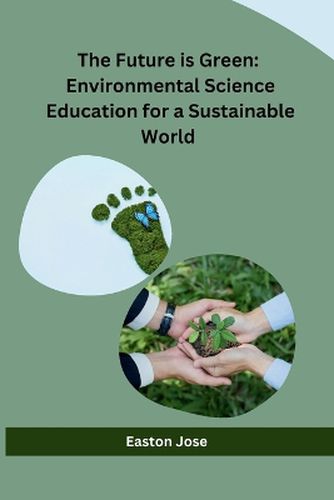Readings Newsletter
Become a Readings Member to make your shopping experience even easier.
Sign in or sign up for free!
You’re not far away from qualifying for FREE standard shipping within Australia
You’ve qualified for FREE standard shipping within Australia
The cart is loading…






This title is printed to order. This book may have been self-published. If so, we cannot guarantee the quality of the content. In the main most books will have gone through the editing process however some may not. We therefore suggest that you be aware of this before ordering this book. If in doubt check either the author or publisher’s details as we are unable to accept any returns unless they are faulty. Please contact us if you have any questions.
Understanding Environmental ScienceEnvironmental science is a multidisciplinary field that explores the intricate relationship between humans and the environment. It encompasses various scientific disciplines such as biology, chemistry, physics, geology, and ecology to understand the complex interactions and interdependencies within our natural world. In this subchapter, we will delve into the fundamental concepts of environmental science and explore its significance in creating a sustainable future for all.Environmental science aims to address pressing environmental issues, including climate change, pollution, deforestation, and resource depletion. By studying the Earth's systems, such as the atmosphere, hydrosphere, biosphere, and lithosphere, environmental scientists gain a comprehensive understanding of the intricate web of life and the impact of human activities on these systems.One of the primary goals of environmental science is to raise awareness and promote sustainability. By studying how ecosystems function and the effects of human intervention, individuals can make informed decisions to minimize their ecological footprint and protect the environment. Understanding the intricate balance between human needs and the preservation of natural resources is crucial for a sustainable future.Environmental science education plays a pivotal role in creating a sustainable world. It equips individuals with the knowledge and skills needed to address environmental challenges and develop innovative solutions. By integrating scientific principles with real-world applications, science education fosters critical thinking, problem-solving, and environmental stewardship.For students, studying environmental science provides a foundation for understanding the complexities of the natural world and the impact of human activities. It encourages them to become responsible global citizens who actively engage in sustainable practices and advocate for environmental conservation.For educators, environmental science education offers a platform to inspire and empower the next generation of environmental leaders. By incorporating hands-on activities, field experiences, and inquiry-based learning, teachers can cultivate a passion for the environment and instill a sense of responsibility towards its protection.
$9.00 standard shipping within Australia
FREE standard shipping within Australia for orders over $100.00
Express & International shipping calculated at checkout
This title is printed to order. This book may have been self-published. If so, we cannot guarantee the quality of the content. In the main most books will have gone through the editing process however some may not. We therefore suggest that you be aware of this before ordering this book. If in doubt check either the author or publisher’s details as we are unable to accept any returns unless they are faulty. Please contact us if you have any questions.
Understanding Environmental ScienceEnvironmental science is a multidisciplinary field that explores the intricate relationship between humans and the environment. It encompasses various scientific disciplines such as biology, chemistry, physics, geology, and ecology to understand the complex interactions and interdependencies within our natural world. In this subchapter, we will delve into the fundamental concepts of environmental science and explore its significance in creating a sustainable future for all.Environmental science aims to address pressing environmental issues, including climate change, pollution, deforestation, and resource depletion. By studying the Earth's systems, such as the atmosphere, hydrosphere, biosphere, and lithosphere, environmental scientists gain a comprehensive understanding of the intricate web of life and the impact of human activities on these systems.One of the primary goals of environmental science is to raise awareness and promote sustainability. By studying how ecosystems function and the effects of human intervention, individuals can make informed decisions to minimize their ecological footprint and protect the environment. Understanding the intricate balance between human needs and the preservation of natural resources is crucial for a sustainable future.Environmental science education plays a pivotal role in creating a sustainable world. It equips individuals with the knowledge and skills needed to address environmental challenges and develop innovative solutions. By integrating scientific principles with real-world applications, science education fosters critical thinking, problem-solving, and environmental stewardship.For students, studying environmental science provides a foundation for understanding the complexities of the natural world and the impact of human activities. It encourages them to become responsible global citizens who actively engage in sustainable practices and advocate for environmental conservation.For educators, environmental science education offers a platform to inspire and empower the next generation of environmental leaders. By incorporating hands-on activities, field experiences, and inquiry-based learning, teachers can cultivate a passion for the environment and instill a sense of responsibility towards its protection.